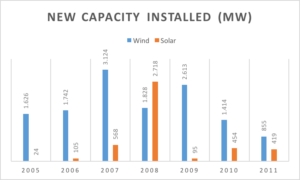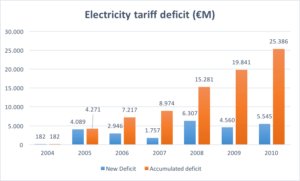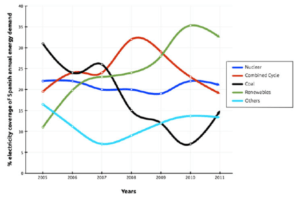Do political parties use climate change demagogically?

Climate change is a frequent topic in political debates, but what is the real objective of politicians when defining their energy policy? Is it to reduce global warming or just to maximize re-election probabilities? This article provides evidence of a left-wing party using climate change demagogically to attract voter support
Climate change is a frequent topic in political debates, with liberals typically more environmentally concerned than conservatives.[1] However, do liberal political parties adapt their environmental policies to maximize their popularity, sometimes with a position that can negatively impact global warming?
Pushing renewable energy first and then supporting the coal industry, the PSOE[2], – Spanish biggest left-wing political party – has used climate change to maximize voter support, not necessarily in the best interest of the environment.
During the 2004 Presidential Election campaign, PSOE’s central claim regarding energy policy was to promote renewable energies[3]. This attracted many “green” votes and Zapatero[4] won the Election. In 2007, Zapatero approved new incentives to subsidize the installation of new renewable capacity, causing a boom in wind and solar.
Figure 1
Source: Own elaboration based on data from IDAE[5]
Increasing renewable energies’ penetration had two effects:
- Renewable energies substituted other generation sources, such as coal-based thermoelectric generation. Since the electricity demand for the 2007 to 2011 period remained stable[6], some suppliers had to reduce their generation weight.
Figure 2
Source: Own elaboration based on data from REE
Thermoelectric plants burned coal to generate electricity. This coal was mainly extracted from mines located in the north of Spain, where PSOE had a strong basis of voters’ support.
When the introduction of renewable energies started to reduce the need of thermoelectric generation (from 26% to 7% of electricity demand in just three years[7]), the mining companies tried to export the Spanish coal, but it was less competitive than international standards due to its high price (despite EU subsidies to national coal) and higher contamination standards (containing 1-5% of sulfur vs 0.5% standard[8]).
As a consequence, mines reduced their extracting operations and unemployment of miners rose. Strong lobbying from the mining sector and combative miners’ protests burst.
- Promoting the installation of renewable energies increased public debt, since electricity tariffs paid by end consumers did not cover the subsidies paid to renewable generators.
Figure 3
Source: Own elaboration based on data from Bankinter[9]
In 2010 the Spanish Government was struggling due to the financial and sovereign debt crisis. Employment and economic viability were now the main concerns of the population.
In this context, PSOE reconsidered its position towards climate change and adapted to the new situation. The party believed that the economic and political cost of pushing renewable energy further was not worth it.
- Zapatero decided to cut subsidies by 30% and 10% to solar and wind with the objective of mitigating the deficit increase[10].
- In parallel, Zapatero set aside his fight against global warming to support the environmentally unfriendly coal industry. The Government passed the “Coal Act” which established an obligatory quota for coal-based power generation of up to 15% of electricity demand while approving subsidies to plants buying domestic coal[11]. The objective of this action was to content the mining industry and preserve jobs. PSOE still maintains this position today.[12]
This political change had an important impact in climate change: it reversed the environmental efficiency gains accumulated over the past several years, altering Spain’s electricity generation mix and increasing CO2 emissions by 35% in 2011 from the previous year.[13]
Figure 4
Source: Red Eléctrica Española[14]
Conclusion
This case presents a clear example of the trade-offs politicians confront when addressing climate change: what prevails, current employment and economic viability or future environmental sustainability? What is the social cost of fighting climate change and how many unemployed families are worth one ton of CO2 saved?
In my opinion, political parties should stay true to their fight against climate change, even when temporary side effects may reduce the popularity of their longer-term goals. Going forward PSOE could follow these steps to adapt its energy policy and fight climate change more effectively:
- Promote labor reconversion of mining areas
- Promote the conversion of coal-fired power plants into combined-cycle gas power plants
- Define an economically sustainable subsidy-system to promote renewable energies again
(Word count: 649)
[1] Riley E. Dunlap, Aaron M. McCright & Jerrod H. Yarosh, “The Political Divide on Climate Change: Partisan Polarization Widens in the U.S.”, Environment: Science and Policy for Sustainable Development, August 25, 2016
[2] Partido Socialista Obrero Español has tradionally been the biggest left-wing party in Spain’s democracy
[3] PSOE’s Policitical Program for the 2004 Presidential Elections, p. 113
[4] José Luis Rodríguez Zapatero was President of Spain from 2004 to 2011 as the national leader of the PSOE, after winning the 2004 and 2008 Presidential Elections
[5] IDAE, Instituto para la Diversificación y el Ahorro de Energético, Informe Estadístico de Energías Renovables, http://informeestadistico.idae.es/t10.htm (accessed October 3, 2016)
[6] Source: Red Eléctrica Española, Balance Eléctrico Anual Nacional, 2007-2013
[7] Red Eléctrica Española, El sistema eléctrico español en 2010 [The Spanish electricity system in 2010], 2011
[8] http://www.20minutos.es/noticia/1473133/0/claves/sector-minero/carbon/
[9] Bankinter, La CNMC acaba de publicar un informe donde repasa la evolución del déficit de tarifa, March 2016
[10] Royal Decree-Law 14/2010, of December 23, 2010, by which urgent measures to correct the electricity tariff déficit are approved
[11] Royal Decree 134/2010, of February 12, 2010, and subsequent Royal Decree 1221/2010, of October 1, 2010
[12] La Voz de Asturias, El PSOE compromete en Madrid su acción parlamentaria en defensa del carbón, September 21, 2016 http://www.lavozdeasturias.es/noticia/economia/2016/09/21/sind/00031474471029930985144.htm, (accessed on October 3, 2016)
[13] Comisión Nacional de la Energía, Informe Anual de Supervisión del Mercado Eléctrico 2011 [Annual Report on Electricity Market 2011], 2012
[14] Amaranta Herrero & Louis Lemkow, Environmentally Blind Discourses on Coal Extraction and the Idealization of the Miner in Spain, Capitalism Nature Socialism, July 24, 2015, p. 215-235








Hi Gabo,
Thank you for your excellent article on the political ramifications of pushing a renewable energy agenda in Spain.
This is indeed one of the core issues for Democracy: the difficulty and the unwillingness for politicians to propose ambitious, long-term programs to an electorate that is essentially more interested in short electoral cycles of 4-5 years. This is why the West needs real Statesmen and Stateswomen, not mere politicians and or demagogues, capable of focusing the entire population’s efforts on a common and ambitious agenda. Just as JFK was able to catalyze the efforts of an entire nation just to bring two men on the Moon, we need today to concentrate all of our efforts on the ambitious goal of becoming completely independent from fossil fuels.
The advantages for our societies are numerous, and on balance, much higher compared to today’s fossil fuel economy. Lower reliance on imports, for instance, can lead to better wealth distribution in our countries, while health will improve, increasing the quality of life of our citizens and lowering our medical bill. Even more importantly, the R&D efforts in the renewable energy industry can be a real boon for the West, allowing it to gain a real edge in a technology that will eventually spread to the rest of the world, as the real cost of fossil fuel becomes evident to developing and developed nations alike.
Just as the Apollo program sparked a technology leap in the US in 70’ and 80’s – just think of Intel, GoreTex and telecom satellites [1] – renewables have the potential to reignite our slowing economy, increasing productivity and employment and ensuring that democracy remains the most attractive political system in the world.
This, however, requires investment and bold political moves, such as banning fossil fuels altogether and financing important scientific programs: how many politicians are ready to do so today?
[1] https://www.theguardian.com/science/2012/dec/16/apollo-legacy-moon-space-riley
Gabo – to your point about the need for “real Statesmen and Stateswomen, not mere politicians and or demagogues, capable of focusing the entire population’s efforts on a common and ambitious agenda”, I believe we also need to reevaluate the language we use to describe pro-environmental policies and initiatives.
The Liberal Party of Canada lost the 2008 federal election at least party due to their “green shift” policy, which the opposing Conservative Party immediately described as a “tax trick.”[1]
British journalist Leo Hickman hits the nail on the head with the following assertion in his 2009 Guardian article: “No matter how hard they try to convince us otherwise, the Greens seem destined to remain on the fringes so long as they are perceived by the electorate to be a one-issue political force. (The clue’s in the name.)”[2]
My view is that we are stuck making sweeping claims – rather than engage in nuanced, thoughtful discussions – on the topic of climate change policy so long as we confine ourselves to believing that “green” is at odds with growth, and synonymous with taxes.
[1] http://www.ctvnews.ca/dion-introduces-green-shift-carbon-tax-plan-1.303506
[2] https://www.theguardian.com/commentisfree/cif-green/2009/jun/10/green-party-european-elections
Gabo,
Thank you for writing in the context of Spain, what we see in so many countries. Unfortunately, the way our political systems are set up (perhaps one of the tricky parts of democracy), instant gratification of the public is more rewarded than long term strategic actions. And once again, it all boils down to the education of the public.
I found it interesting that the government did not anticipate the severity of unemployment in the mining sector caused by increased dependency on renewables. In fact, I would think they would try to use the increasing number of jobs in the renewables sector to employ the minors who lost their jobs.
I absolutely agree with Gng above that when it comes to political discourse in the media, our leaders are still stuck – and happily so – on their oversimplified stances, since it’s much easier to use such topics to polarize people and earn votes. I really see no hope in achieving the necessary milestones to curb climate change if we depend solely on elected officials. To me, the best way forward seems to be for private organizations to take charge of addressing climate change, creating the necessary jobs and infrastructure, and hope that governments do their part on the policy side.
Great post and a very interesting topic affecting many countries, particularly within EU. The Paris Climate Conference agreement stating that each European country has to produce 15% of its total energy from renewables by 2020 has a lot of implications for politics. As you mentioned, it is always easier to focus on short term popularity among voters than promote policies that support long term growth and sustainability. In Poland the current party in power just passed a legislation drastically limiting the growth of wind farms and inherently protecting the coal industry. Do you see such legislation coming through in Spain? Do you think EU should enforce more power or fines for countries that fail to meet the 2020 “green targets” in order to push the local political agenda in the right direction?
Great article that summarizes most of the root causes that have lead to the current energy crisis in Spain.
You finish your article claiming that the left wing parties should put their money were their mouth is. The problem is that most government policies have little short term effect and the results are hard to attribute to the party that promoted them. On climate change this issue is exacerbated, because the consequences are long term and some parties use this to their short-term advantage. To support this long term myopia I will add some facts: (i) Spain is the country with most international arbitration processes open in the world thanks to Zapatero’s subsidy policies, (ii) Spanish people have one of the most expensive electric tariff in Europe and (iii) the conservative party recently passed a law to dissuade people from installing solar panels because we have excess capacity.
In conclusion, it might be enticing to lure in the voters who want to to have their cake (renewables everywhere) and it eat to (cheap), but climate change is an issue where policymakers should agree, instead of putting rock on the way of the others.